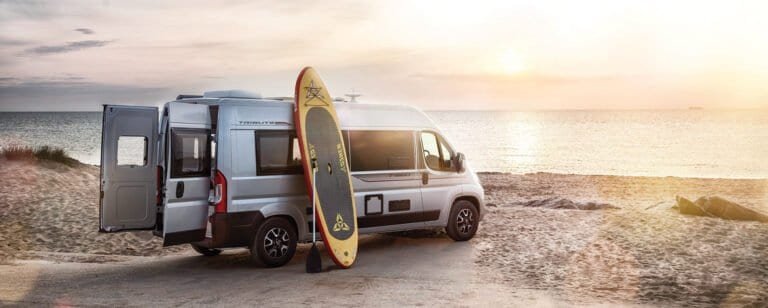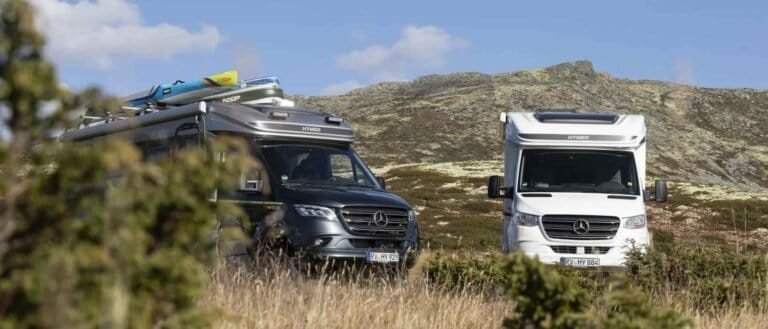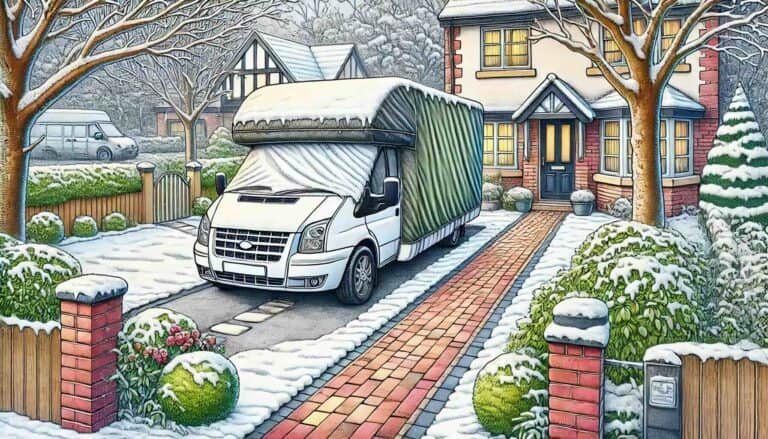Key Takeaways
- Essential steps for planning a campervan or motorhome trip
- Tips for first-time travellers
- Common mistakes to avoid
Introduction
The allure of the open road and the freedom to explore at your own pace have made campervan and motorhome travel increasingly popular. Having personally travelled through the rugged coastlines of Ireland, the scenic north coast of Spain, the diverse landscapes of the UK in Wales and England, and the charming regions of France from Normandy to Île de Ré and beyond, I can attest to the incredible experiences this form of travel offers. Whether you’re exploring familiar territory or venturing into new regions, planning your trip is crucial to ensure a smooth and enjoyable journey. This guide will help you navigate the essentials of planning your first campervan or motorhome adventure.
Getting Started with Planning
Proper planning sets the foundation for a successful trip. Start by setting your travel goals and expectations. Determine what you want to achieve during your trip, whether it’s relaxation, adventure, cultural experiences, or a mix of everything. This will help shape your itinerary and ensure that your trip meets your needs and desires.
Next, research destinations and attractions. Use travel guides, blogs, and forums to gather information on potential destinations. Make note of must-see attractions and any special events happening during your travel period. This research will help you create a list of places you want to visit and activities you want to do.
Finally, create a flexible itinerary. While it’s important to have a plan, leaving some room for spontaneity can make your journey more enjoyable. Unexpected discoveries and spontaneous stops often become the highlights of a trip. Aim for a balance between scheduled activities and free time.
- Set Your Travel Goals: Define what you want to achieve (relaxation, adventure, cultural experiences).
- Research Destinations: Gather information from travel guides, blogs, and forums.
- Create a Flexible Itinerary: Plan for both scheduled activities and spontaneous stops.
Choosing Your Destinations and Routes
Selecting the right destinations and routes is essential for an enjoyable trip. In Ireland, popular campervan and motorhome routes include the Wild Atlantic Way and the Ring of Kerry, both offering stunning views and memorable experiences. These routes are well-known for their scenic beauty and well-maintained roads, making them ideal for first-time travellers.
For those looking to explore beyond the beaten path, consider hidden gems such as the Beara Peninsula. This area offers breathtaking landscapes with fewer crowds, providing a more intimate and serene travel experience. Incorporating such locations into your itinerary can make your trip unique and memorable.
When planning your routes, use tools like Google Maps and Roadtrippers to find the most scenic and safe paths. These tools provide information on road conditions, travel times, and points of interest along the way. In addition to planning your routes, it’s important to consider specific driving conditions in each country:
- Ireland: Be prepared for narrow, winding roads, especially in rural areas. Always drive on the left side of the road and be cautious of changing weather conditions.
- Spain: The north coast offers coastal views and charming towns. Be mindful of mountain roads and varying weather conditions.
- UK: Exploring Wales and England provides a mix of countryside, historic sites, and cities. Drive on the left side and be prepared for narrow rural roads.
- France: From Normandy to Île de Ré, the roads are well-maintained but be aware of toll roads (autoroutes) and local driving customs.
Preparing Your Vehicle
Ensuring your vehicle is ready for the trip is crucial. Start with essential vehicle checks before the trip. Perform thorough checks on the oil, coolant, tire pressure, brakes, and lights to ensure your vehicle is in top condition. Regular maintenance can prevent many issues and ensure a smooth journey.
Packing the right gear and supplies is also important. Include kitchen supplies, bedding, outdoor gear, clothing for various weather conditions, electronics, and entertainment items. Make a checklist to ensure you don’t forget any essentials.
Organising the interior for efficiency can make your trip more comfortable. Keep frequently used items accessible and ensure your storage is well-organised to maximise space and convenience. Using storage solutions like bins and organisers can help keep the interior tidy and functional.
- Essential Vehicle Checks: Check oil, coolant, tire pressure, brakes, and lights.
- Packing Gear and Supplies: Include kitchen supplies, bedding, outdoor gear, and entertainment items.
- Organising Interior: Use storage solutions to keep the interior tidy and functional.
Managing Campsites and Overnight Stays
Planning where to stay each night is essential for a smooth trip. Finding and booking campsites in advance can save you time and stress. Use websites and apps to reserve your spot, especially during peak seasons. Local knowledge can also be valuable, so don’t hesitate to ask locals for recommendations on lesser-known spots.
Free camping options and regulations vary by country:
- Ireland: Wild camping is generally not legal without the landowner’s permission. However, it is often tolerated in remote areas if you camp responsibly. Follow the principles of Leave No Trace, avoid camping on private property, and respect local guidelines.
- Spain and UK: Wild camping is generally restricted. Always seek local advice and follow regulations.
- France: While wild camping is popular, it’s regulated. Use designated areas and respect local rules.
For a comfortable and safe stay, choose campsites with good reviews and necessary amenities. Follow campsite rules and ensure your vehicle is secure. Being respectful of other campers and the environment will enhance your overall experience.
- Finding Campsites: Use websites and apps to book in advance.
- Free Camping Regulations: Follow local guidelines and camp responsibly.
- Comfortable Stay: Choose campsites with good reviews and amenities.
On the Road: Practical Tips
Practical advice can make your journey smoother. Driving and navigation tips for Ireland include using GPS devices and apps for navigation, paying attention to road signs, and understanding local driving customs. These tools can help you stay on course and avoid getting lost.
Managing fuel and resources is crucial for a smooth trip. Keep an eye on fuel levels and plan refuelling stops. Conserve water and power by using resources efficiently. This will help you avoid running out of essentials in remote areas.
Staying connected and entertained is also important. Consider a portable Wi-Fi device for staying connected. Bring books, games, and outdoor activity gear like bicycles or kayaks for entertainment. These items can make your downtime more enjoyable.
- Driving Tips: Use GPS and apps for navigation, pay attention to road signs.
- Managing Resources: Plan refuelling stops, conserve water and power.
- Staying Entertained: Bring books, games, and outdoor activity gear.
Plan Your Activities
Having a list of activities planned can enhance your travel experience. Consider outdoor activities such as hiking, cycling, and fishing, and explore local attractions and landmarks. Engage with local communities by attending cultural events or festivals and trying regional dishes.
Outdoor Activities to Consider:
- Hiking: Explore local trails and nature reserves.
- Ireland: The Wicklow Mountains offer beautiful trails suitable for all levels.
- Spain: The Picos de Europa in the north provide stunning vistas and diverse wildlife.
- UK: Snowdonia in Wales and the Lake District in England are must-visit spots for hiking enthusiasts.
- France: The trails in the Loire Valley and the coastal paths in Brittany are ideal for scenic hikes.
- Cycling: Bring bikes to explore the area.
- Ireland: The Great Western Greenway offers a scenic and safe route for cyclists.
- Spain: The Camino de Santiago includes routes for both hikers and cyclists.
- UK: The Camel Trail in Cornwall and the Taff Trail in Wales are perfect for leisurely rides.
- France: The Vélodyssée, a coastal cycling route, is perfect for exploring the Atlantic coast.
- Fishing: Research local fishing spots and regulations.
- Ireland: Lough Corrib is renowned for trout fishing.
- Spain: The Ebro River is a popular spot for catfish and carp fishing.
- UK: The River Test in England is famous for its fly fishing.
- France: The Dordogne River offers great fishing opportunities for various species.
Exploring Local Attractions and Landmarks:
- Tourist Spots: Visit popular attractions along your route.
- Ireland: The Cliffs of Moher and the Giant’s Causeway are must-sees.
- Spain: The Guggenheim Museum in Bilbao and the historic town of Santiago de Compostela.
- UK: Stonehenge and the historic cities of Bath and York.
- France: Mont Saint-Michel in Normandy and the castles along the Loire Valley.
- Hidden Gems: Ask locals for recommendations on lesser-known sites.
- Ireland: Explore the lesser-known Beara Peninsula for stunning views and fewer crowds.
- Spain: Discover the charming village of Comillas in Cantabria.
- UK: Visit the picturesque village of Bibury in the Cotswolds.
- France: Explore the quaint town of Dinan in Brittany for a taste of medieval France.
Engaging with Local Communities:
- Cultural Experiences: Attend local events or festivals.
- Ireland: Experience traditional Irish music sessions in local pubs.
- Spain: Join in the festivities of a local fiesta.
- UK: Attend a country fair or a local market.
- France: Participate in a wine tasting event in Bordeaux or a village fête.
- Local Cuisine: Try regional dishes and visit local markets.
- Ireland: Enjoy seafood chowder and freshly baked soda bread.
- Spain: Indulge in pintxos in the Basque Country and paella in Galicia.
- UK: Sample Welsh cakes in Wales and fish and chips by the English seaside.
- France: Taste crepes in Brittany, seafood in Normandy, and world-class wines in Bordeaux.
Safety Tips
Safety should always be a priority on your trip. Driving safety tips include adhering to local speed limits and road signs, and being prepared for sudden changes in weather, especially in rural areas. Staying safe at campsites involves locking your vehicle, following campsite rules, and respecting other campers.
Driving Safety:
- Speed Limits: Adhere to local speed limits and road signs.
- Ireland: The speed limits are typically 50 km/h (31 mph) in urban areas, 80 km/h (50 mph) on regional and local roads, 100 km/h (62 mph) on national roads, and 120 km/h (75 mph) on motorways. Be mindful of changing speed limits, especially in rural areas.
- Spain: The speed limits are usually 50 km/h (31 mph) in urban areas, 90 km/h (56 mph) on secondary roads, 100 km/h (62 mph) on main roads, and 120 km/h (75 mph) on motorways. Watch for varying speed limits on mountain roads and coastal highways.
- UK: The speed limits are generally 30 mph (48 km/h) in built-up areas, 60 mph (97 km/h) on single carriageways, and 70 mph (113 km/h) on dual carriageways and motorways. Follow the speed limits, which can vary significantly between rural and urban areas.
- France: The speed limits are typically 50 km/h (31 mph) in urban areas, 80 km/h (50 mph) on secondary roads, 110 km/h (68 mph) on main roads, and 130 km/h (81 mph) on motorways. Be aware of speed cameras and the lower speed limits in wet weather, which drop to 110 km/h (68 mph) on motorways and 100 km/h (62 mph) on main roads.
- Weather Conditions: Be prepared for sudden changes in weather, especially in rural areas.
- Ireland: The weather can change rapidly; always carry waterproof clothing.
- Spain: Coastal areas can be windy; ensure your vehicle is prepared for gusts.
- UK: Rain is common; ensure your vehicle’s wipers and lights are in good condition.
- France: Summers can be hot in the south; ensure your vehicle is equipped for high temperatures.
Staying Safe at Campsites:
- Security: Lock your vehicle when leaving it unattended and keep valuables secure.
- Campsite Rules: Follow the rules and guidelines of each campsite.
- Ireland: Respect the tranquility of rural campsites.
- Spain: Keep noise to a minimum in campsites near residential areas.
- UK: Follow the specific rules for waste disposal and recycling.
- France: Many campsites have quiet hours; ensure you adhere to them.
Health and Emergency Contacts:
- Emergency Numbers: Keep a list of emergency contacts and local health services.
- Ireland: The emergency number is 112 or 999.
- Spain: The emergency number is 112.
- UK: The emergency number is 999 or 112.
- France: The emergency number is 112.
- Health Kit: Carry a well-stocked first aid kit and any necessary medications.
- Ireland: Include remedies for common colds and flu, especially in colder months.
- Spain: Carry sunblock and hydration solutions for hotter climates.
- UK: Include allergy medications and insect repellent.
- France: Ensure you have medications for common travel ailments, such as digestive issues.
Dealing with Common Challenges
Be prepared for unexpected situations to ensure a smooth trip. Handling unexpected situations with a calm and prepared approach can make a significant difference. Carry a list of emergency contacts and local health services, so you know who to call if needed.
Vehicle maintenance on the go is crucial. Regularly check the oil, coolant, and tire pressure. Keep the vehicle clean, perform routine inspections for leaks, and ensure lights and indicators are functioning. Being proactive with maintenance can prevent many issues.
Staying safe and secure during your trip is also important. Lock your vehicle when leaving it unattended and keep valuables secure. Follow local guidelines for safe camping and driving.
- Handling Emergencies: Carry emergency contacts and stay calm.
- Vehicle Maintenance: Perform regular checks and keep the vehicle clean.
- Staying Safe: Lock your vehicle and follow local guidelines.
Conclusion
Planning your first campervan or motorhome trip can be an exciting adventure. By carefully planning your route, booking campsites in advance, packing essentials, and understanding basic maintenance, you’ll ensure a smooth and enjoyable journey. Embrace the freedom of the open road and the opportunity to explore new places at your own pace.
FAQs
What should I pack for a campervan trip? When packing for a campervan trip, include essentials such as kitchen supplies (portable stove, pots and pans, utensils), bedding (sleeping bags, pillows), outdoor gear (chairs, table), clothing for various weather conditions, electronics (cameras, chargers), entertainment (books, games), and a well-stocked first aid kit.
How do I choose the right motorhome for my needs? Choosing the right motorhome depends on your travel plans, the number of travellers, and your budget. Consider the size, amenities, and whether you prefer renting or buying. Research different models and read reviews to find the best fit for your needs.
Can I wild camp in Ireland? Wild camping in Ireland is generally not legal without the landowner’s permission. However, it is often tolerated in remote areas if done responsibly. Follow the principles of Leave No Trace, avoid private property, and respect local guidelines.
How do I plan a route for my campervan trip? Plan your route by listing desired destinations and stops, using route planning tools like Google Maps, Roadtrippers, and Campercontact. Consider the types of roads, scenic routes, and personal recommendations for each region you plan to visit.
What are the best campsites in Ireland for motorhomes? Some of the best campsites in Ireland for motorhomes include the Morriscastle Strand Holiday Park in Wexford, Eagle Point Camping in Cork, and Camac Valley Tourist Caravan and Camping Park in Dublin. These sites offer various facilities and scenic locations.
What should I know about driving a motorhome in Ireland? Driving a motorhome in Ireland involves navigating narrow, winding roads, especially in rural areas. Always drive on the left side, adhere to speed limits, and be cautious of changing weather conditions. Use a GPS and plan your route in advance.
Are there any legal requirements for campervan travel in Ireland? Ensure your campervan is insured and that you have a valid driver’s license. It’s also essential to familiarise yourself with local driving laws, such as speed limits and parking regulations. Carry necessary documents, including vehicle registration and insurance papers.
How do I maintain a campervan during a trip? Regularly check the oil, coolant, and tire pressure. Keep the vehicle clean, perform routine inspections for leaks, and ensure lights and indicators are functioning. Follow campsite guidelines for waste disposal and handle minor repairs with a basic tool kit.
What activities can I do on a motorhome trip? Activities on a motorhome trip include hiking, cycling, fishing, exploring local attractions and landmarks, attending cultural events or festivals, and sampling regional cuisine. Engage with local communities to discover hidden gems and unique experiences.
How do I stay safe while travelling in a campervan? Stay safe by adhering to local speed limits, being prepared for weather changes, securing your vehicle at campsites, following campsite rules, and keeping emergency contacts handy. Carry a well-stocked first aid kit and necessary medications.








